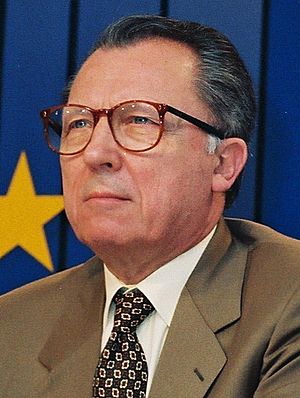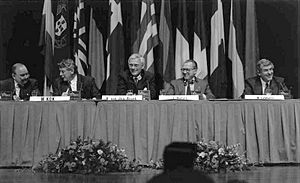Jacques Delors facts for kids
Quick facts for kids
Jacques Delors
|
|
|---|---|

Delors in 1993
|
|
| President of the European Commission | |
| In office 7 January 1985 – 24 January 1995 |
|
| Vice President | Frans Andriessen |
| Preceded by | Gaston Thorn |
| Succeeded by | Jacques Santer |
| Minister of Finance | |
| In office 22 May 1981 – 17 July 1984 |
|
| Prime Minister | Pierre Mauroy |
| Preceded by | René Monory |
| Succeeded by | Pierre Bérégovoy |
| Member of the European Parliament | |
| In office 1 July 1979 – 25 May 1981 |
|
| Constituency | East France |
| Personal details | |
| Born |
Jacques Lucien Jean Delors
20 July 1925 Paris, France |
| Died | 27 December 2023 (aged 98) Paris, France |
| Political party | Socialist Party |
| Spouse |
Marie Lephaille
(m. 1948; died 2020) |
| Children | Martine |
| Alma mater | University of Paris |
Jacques Lucien Jean Delors (born 20 July 1925 – died 27 December 2023) was an important French politician. He served as the eighth President of the European Commission from 1985 to 1995. This is a very powerful role in Europe.
As President of the European Commission, Delors helped create the single market and the euro. The single market made it easier for people, money, goods, and services to move freely between European countries. The euro is the single currency used by many European nations today. Before this, he was France's Minister of Finance from 1981 to 1984. He was also a Member of the European Parliament from 1979 to 1981.
Delors was a very influential leader in Europe. He worked to bring European countries closer together. He led the Delors Committee, which suggested creating a single currency, the euro. This idea became real when the Maastricht Treaty was signed in 1992.
Contents
Early Life and French Politics
Jacques Delors was born in Paris, France. In the 1940s through the 1960s, he worked in French banking and government planning. He was part of a Christian trade union called the French Confederation of Christian Workers (CFTC). He helped change it into the French Democratic Confederation of Labour (CFDT).
In 1969, he became an adviser on social issues to the French Prime Minister, Jacques Chaban-Delmas. This was when people in the media first started to notice Delors. In 1974, Delors joined the Socialist Party. He was one of the few members who were openly religious.
From 1979 to 1981, he was a member of the European Parliament. He led the Committee on Economic and Monetary Affairs. He took part in many discussions about money and social policies in Europe.
Under President François Mitterrand, Delors became France's Minister of Economics and Finance from 1981 to 1984. He believed in a market economy and wanted France to work closely with other European countries. He also made sure France stayed part of the European Monetary System (EMS). This helped keep the French currency stable.
Leading the European Commission

Jacques Delors became the President of the European Commission in January 1985. During his time as president, he made important changes to the budget. He also prepared the way for the single market in the European Community. This single market started on 1 January 1993. It allowed people, money, goods, and services to move freely between member countries.
Delors also led a group called the Committee for the Study of Economic and Monetary Union. This group is often called the Delors Committee. In 1989, they suggested creating a new currency, the euro. This new currency would replace the different national currencies. This big change happened with the signing of the Maastricht Treaty in 1992.
Delors had a different idea about how economies should work compared to some other leaders at the time. He believed that capitalism should also support social well-being in Europe. He wanted to help those who were less fortunate. He also aimed to boost European industry. His focus on the social side of Europe became a very important part of what the European Union stands for. Many people see his time as president as a high point for European integration.
After His Presidency
Delors was always interested in education. In France, he helped create a law in 1971. This law required companies to set aside money for their employees' education. From 1993 to 1996, he led a UNESCO group on education for the future. Their report, Learning: the Treasure Within, is still very important for ideas about lifelong learning.
In 1994, some members of the Socialist Party wanted Delors to run for president of France. Polls showed he had a good chance to win. However, Delors decided not to run.
In 1995, Delors won the Charles V Prize. This award recognizes people who have contributed a lot to Europe.
In 1996, Delors started a think tank in Paris called Notre Europe. A think tank is a group that does research and gives advice on public policy. He remained one of its leaders for the rest of his life. He also supported the Spinelli Group in 2010. This group works to bring the countries of the European Union even closer together.
In 2012, Delors said that if the United Kingdom could not support more integration in Europe, they could still be friends. But they might need a different kind of agreement, like a free-trade deal.
On 25 June 2015, Delors was given the title of Honorary Citizen of Europe. This special award recognized his amazing work in developing the European project.
Personal Life
Jacques Delors was married to Marie Lephaille. She passed away in 2020. They had a daughter named Martine Aubry. She later became a leader of the French Socialist Party. They also had a son, Jean-Paul Delors, who was a journalist. Sadly, Jean-Paul died at the age of 29 in 1982.
Jacques Delors died peacefully in his sleep at his home in Paris on 27 December 2023. He was 98 years old.
Awards and Honours
- 1999: Member of the Royal Academy of Science, Letters and Fine Arts of Belgium
- 2005: Pax Christi International Peace Award
- Honorary Citizen of Europe
- Freedom medal (1990)
National Honours
 Austria : Grand Decoration of Honour in Gold with Sash of the Decoration of Honour for Services to the Republic of Austria
Austria : Grand Decoration of Honour in Gold with Sash of the Decoration of Honour for Services to the Republic of Austria Estonia : First Class of the Order of the Cross of Terra Mariana
Estonia : First Class of the Order of the Cross of Terra Mariana France : Commander of the Legion of Honour
France : Commander of the Legion of Honour Germany : Grand Cross of the Order of Merit of the Federal Republic of Germany
Germany : Grand Cross of the Order of Merit of the Federal Republic of Germany Germany : Medal of the Order of Merit of Baden-Württemberg
Germany : Medal of the Order of Merit of Baden-Württemberg Germany : Knight of the Bavarian Order of Merit
Germany : Knight of the Bavarian Order of Merit Hungary : Grand Cross of the Order of Merit of the Republic of Hungary
Hungary : Grand Cross of the Order of Merit of the Republic of Hungary Peru: Grand Cross of the Order of the Sun of Peru
Peru: Grand Cross of the Order of the Sun of Peru Poland : Knight Grand Cross of the Order of Merit of the Republic of Poland
Poland : Knight Grand Cross of the Order of Merit of the Republic of Poland Portugal : Grand Cross of the Order of Christ
Portugal : Grand Cross of the Order of Christ Portugal : Grand Cross of the Order of Prince Henry
Portugal : Grand Cross of the Order of Prince Henry Spain : Knight Grand Cross of the Order of Isabella the Catholic
Spain : Knight Grand Cross of the Order of Isabella the Catholic
See also
 In Spanish: Jacques Delors para niños
In Spanish: Jacques Delors para niños

